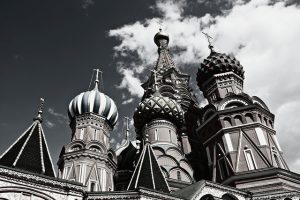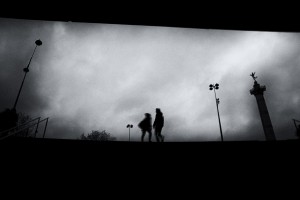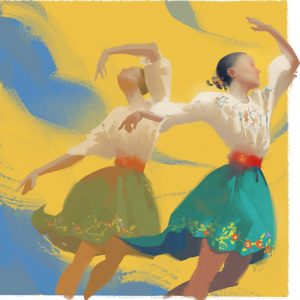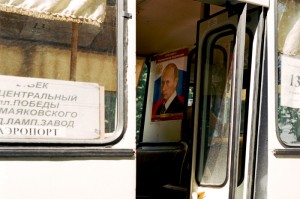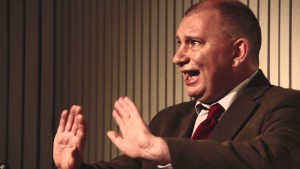Opposition in exile: in conversation with Ivan Zhdanov
by Harry Buller | June 2, 2024
I fiddle nervously with my computer. I’m waiting for Ivan Zhdanov, a leading figure of the modern Russian opposition, to join a Zoom call. I sit in my university bedroom, Zhdanov against the backdrop of his children’s playroom; talking about how Alexi Navalny’s murder has shaped the Russian opposition, how life changed after the war, and the realities of living as an exile and enemy of the Russian state.
Zhdanov was a close friend of Alexei Navalny, the murdered Russian opposition leader, and now works as director of Фонд борьбы с коррупцией, the Anti Corruption Foundation. The organisation was established in 2011 by Navalny and conducts investigations into high profile cases of corruption in Russia. With talk of private web browsers and VPNs, Zhdanov may appear unrecognisable to the Russian opposition figures of fifty years ago, the Samizdat, who copied dissident materials by hand and typewriter. However, he shares their convictions: it is the same timeless stand against authoritarianism.
Putin rose to power in 1999. He derived his legitimacy from the so-called increased sense of security he promised to provide after the rise in crime and separatist terrorist groups in the 1990s. Any opposition was silenced. Alexander Litvinenko, a defector and critic of the Putin regime was killed with radioactive Polonium-210 in 2006 whilst living in the UK. Now Zhdanov and his colleagues are the targets.
Whilst Zhdanov discusses his own short-term arrests with me in almost casual terms (they seem to become like “days off”), he is quick to draw my attention to the cruel murder and imprisonment of Navalny. “Alexei Navalny received the worst conditions. Putin created special conditions for him. He really was tortured by (…) loud music daily, bright light 22 hours per day, by deprivation of food, and any rights at all. He spent three years in prison and this – all three years – was just torturing him. Absolute cruelty and just slow murdering of him.”
Zhdanov explains further how under Putin everything changed, and how he propagates his government not on terror alone, but also through the unmitigated use of corruption: “Before Putin, it was not so easy to imagine that officials could have all these goods,” he tells me. “The high-level Russian officials can afford anything at all. Mansions, castles, planes and yachts.” The Anti Corruption Foundation declared they had “zero tolerance” for this moral bankruptcy.
All three directors of the foundation, Navalnaya, Pevchikh and Zhdanov, now live in exile for their safety. Former members of the group like Volkov have been attacked and their founder, Navalny, imprisoned in an Arctic prison camp and tortured to death.
In the face of all of this, why would anyone continue fighting? Zhdanov told me, in plain terms, that he did it because “it’s part of our life, and I can’t separate it from my life… I have had my father in prison because of me, because I left Russia and because I fled from Russia. I have my friends in prison. Alexei Navalny was killed in prison.” The weight of this legacy and duty is clear on his shoulders; he speaks with grim determination – so much has been lost, but he refuses to give up hope. “If I even want[ed] to just stop, I would not be able to do it”.
In such a climate of oppression, what methods are available to those who try to resist? One mechanism we discussed was “smart voting.” Zhdanov explains how this tactic worked: “[The] Russian government created the answer for us: smart voting, they created electronic voting, remote voting.” Now you can use “just your laptop and connection to e-government” to vote. Whilst Zhdanov and his fellow exiles cannot participate themselves in elections, they “can give recommendations for millions of our followers to vote for someone who is not from the main political party.” He seems optimistic about the impact of this strategy, adding, “it helped to provide some good candidates to local parliaments in the different regions.” However, as the opposition searches for ways out of the noose of tyranny, Putin closes them just as quickly. Due to the online nature of the voting system, no one can be certain their vote has been recorded accurately, and bots can easily inflate support for Putin and voter turnout. Putin claimed to have won the 2024 election with an unbelievable 88% of the vote on a 77% turnout. With some frustration, Zhdanov remarks, “no one can observe the result, and no one can justify this result.”
The situation in Russia is so dire that straightforward opposition is near impossible. For protests to be tolerated, loopholes need to be found and a kind of plausible deniability established. Noon Against Putin epitomises the difficulty of the situation; Navalny called on voters on the day of the 2024 presidential elections, to gather en masse at polling stations to oppose Putin. Two weeks before Navalny’s murder, lines stretched outside of voting booths as thousands gathered to fulfil the last defiant call for resistance from Navalny. A seemingly small act, but Zhdanov explains the courage it took: “People in Russia are now under the great threat of prison for just posting their opinions on social media, or just walking in protest on the streets and standing picketing.” It may be difficult for residents of England to conceive of a world where resistance emerges in the form of queuing, but for a people used to the experience of repression and unsettled by war, this was bravery unmatched.
In February 2022, Russian tanks rumbled towards Kiev, the capital of Ukraine. As much and as starkly as this moment changed life in Ukraine, it also affected life in Russia. Putin seized on the war as an excuse to clamp down on the last embers of resistance. The Russian opposition that had been tentatively tolerated before the war now became “possible only totally underground”, Zhdanov tells me. He describes how before the war, we had some “independent media like TV Rain or Radio BBC…other international big medias, but now it’s impossible.” The situation is not much better for activists within Russia, who find themselves forced to choose between going east to arctic prison camps, or west into exile.
It’s either being “imprisoned” or “need to flee from Russia,” Zhdanov adds. Indeed, like most Russian activists, Zhdanov operates outside of Russia. The introduction of harsh legislation since the war, such as the Russian 2022 war censorship laws, which has been used to sentence at least 50 public figures in Russia for discussing the war in Ukraine negatively, demonstrates the growing intensity of Russian repression. Zhdanov tells me he is considered one the most dangerous offenders by Putin’s government: “We are recognised as terrorists, and it means that any connection with us can lead to ten years in prison.”
Zhdanov shares with me the difficulties of leading a normal life in Russia: “There is a big difference between living in Russia and living in Europe… [in Russia] you can be arrested tomorrow.” He adds that whilst living in Russia, he did not, could not, plan for the future. Zhdanov was uncertain that he even had one. Since the war began, Putin has carried out the largest mass arrest in post-Soviet history. About 5,000 people were detained at an anti-war protest on the 6th of March.
Life in exile from Russia is not easy; the FSB and other agents of Putin are at the heels of those who wish to lead lives of freedom. I ask him if he was afraid. He tells me, with the grim determination that I’ve become accustomed to: “We are under great risks, but we took these risks and we understand that it can happen. We understand that it’s part of our life, that we are the main enemies for Vladimir Putin.”
Not every Russian shares the certainty of Zhdanov. He estimates the politics of Russian breaks down into “about 20-25% percent who support Vladimir Putin, honestly support… about 20-25%, quite the same amount of people, who strongly oppose him… about 60% of our population who don’t think about politics.” However, hope exists, burning slowly, underground in Russia, in exile in foreign nations, and in the innocent hearts of the next generation, those children who are yet to be indoctrinated or be reduced to apathy. As our conversation ends, and Zhdanov leaves to pick his kids up from school, I am reminded of their generation. Putin is 71 now; no man can live forever. Time is the great enemy of tyranny. For now, I am reminded of the fragility of tyranny by the words of Alexander Litvinenko, speaking on his own death bed, poisoned by Putin:
“You may succeed in silencing one man, but the howl of protest from around the world will reverberate, Mr. Putin, in your ears for the rest of your life. May God forgive you for what you have done, not only to me but to beloved Russia and its people.”
Putin would perhaps do well to remember these words. I hope he will not be remembered as a great leader, but as a pathetic tyrant. It will be Zhdanov, Navalny, Litvinenko, and those like them, those who held the torch of hope up for the next generation, who will be remembered and celebrated by history.∎
Words by Harry Buller.
